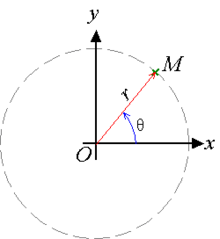Definify.com
Webster 1913 Edition
Angle
An′gle
An′gle
,An′gle
,Webster 1828 Edition
Angle
AN'GLE
,AN'GLE
,AN'GLE
,Definition 2026
Angle
Angle
English
Noun
Angle (plural Angles)
- A member of a Germanic tribe first mentioned by Tacitus, one of several which invaded Britain and merged to become the Anglo-Saxons.
Derived terms
Translations
Anagrams
angle
angle
English
Noun

angle (plural angles)
-
(geometry) A figure formed by two rays which start from a common point (a plane angle) or by three planes that intersect (a solid angle).
- the angle between lines A and B
-
(geometry) The measure of such a figure. In the case of a plane angle, this is the ratio (or proportional to the ratio) of the arc length to the radius of a section of a circle cut by the two rays, centered at their common point. In the case of a solid angle, this is the ratio of the surface area to the square of the radius of the section of a sphere.
- The angle between lines A and B is π/4 radians, or 45 degrees.
- A corner where two walls intersect.
- an angle of a building
- A change in direction.
- 2013 July-August, Fenella Saunders, “Tiny Lenses See the Big Picture”, in American Scientist:
- The single-imaging optic of the mammalian eye offers some distinct visual advantages. Such lenses can take in photons from a wide range of angles, increasing light sensitivity. They also have high spatial resolution, resolving incoming images in minute detail.
- The horse took off at an angle.
-
- A viewpoint; a way of looking at something.
- 2013 January 1, Katie L. Burke, “Ecological Dependency”, in American Scientist, volume 101, number 1, page 64:
- In his first book since the 2008 essay collection Natural Acts: A Sidelong View of Science and Nature, David Quammen looks at the natural world from yet another angle: the search for the next human pandemic, what epidemiologists call “the next big one.”
- 2005, Adams Media, Adams Job Interview Almanac (page 299)
- For example, if I was trying to repitch an idea to a producer who had already turned it down, I would say something like, "I remember you said you didn't like my idea because there was no women's angle. Well, here's a great one that both of us must have missed during our first conversation."
-
- (media) The focus of a news story.
- (slang, professional wrestling) A storyline between two wrestlers, providing the background for and approach to a feud.
- (slang) An ulterior motive; a scheme or means of benefitting from a situation, usually hidden, often immoral
- His angle is that he gets a percentage, but mostly in trade.
- A projecting or sharp corner; an angular fragment.
- Dryden
- though but an angle reached him of the stone
- Dryden
- (astrology) Any of the four cardinal points of an astrological chart: the Ascendant, the Midheaven, the Descendant and the Imum Coeli.
Synonyms
- (corner): corner
- (change in direction): swerve
- (vertex): -gon (as per hexagon)
- (viewpoint): opinion, perspective, point of view, slant, view, viewpoint
Hyponyms
|
|
|
Derived terms
|
Related terms
See also
Translations
|
|
|
|
|
|
|
|
Verb
angle (third-person singular simple present angles, present participle angling, simple past and past participle angled)
- (transitive, often in the passive) To place (something) at an angle.
- The roof is angled at 15 degrees.
- (intransitive, informal) To change direction rapidly.
- The five ball angled off the nine ball but failed to reach the pocket.
- (transitive, informal) To present or argue something in a particular way or from a particular viewpoint.
- How do you want to angle this when we talk to the client?
- (snooker) To leave the cue ball in the jaws of a pocket such that the surround of the pocket (the "angle") blocks the path from cue ball to object ball.
Translations
Etymology 2
From Middle English anglelen (“to fish”), from angel (“fishhook”), from Old English angel, angul (“fishhook”), from Proto-Germanic *angulō, *angô (“hook, angle”), from Proto-Indo-European *h₂enk- (“something bent, hook”). Cognate with West Frisian angel (“fishing rod, stinger”), Dutch angel (“fishhook”), Icelandic öngull (“fishhook”), German Angel (“fishing pole”), German angeln (“to fish, angle”).
Verb
angle (third-person singular simple present angles, present participle angling, simple past and past participle angled)
- (intransitive) To try to catch fish with a hook and line.
- (informal) (with for) To attempt to subtly persuade someone to offer a desired thing.
- He must be angling for a pay rise.
Derived terms
Translations
|
Noun
angle (plural angles)
- A fishhook; tackle for catching fish, consisting of a line, hook, and bait, with or without a rod.
- Shakespeare
- Give me mine angle: we'll to the river there.
- Alexander Pope
- A fisher next his trembling angle bears.
- Shakespeare
Anagrams
Esperanto
Adverb
angle
Related terms
French
Etymology
From Latin angulus, from Proto-Indo-European *h₂engulos (“joint?”), from *h₂eng-, *ang- (“corner, hirn”).
Pronunciation
- IPA(key): /ɑ̃ɡl/
Noun
angle m (plural angles)
- (geometry) A geometric angle.
- La mesure d'un angle droit est égale à 90 degrés.
- A location at the corner of something, such as streets, buildings, furniture etc.
- A viewpoint or angle.
Usage notes
- Inside a room, the word coin (“corner”) is more usual.
Synonyms
- (a location at the corner): coin